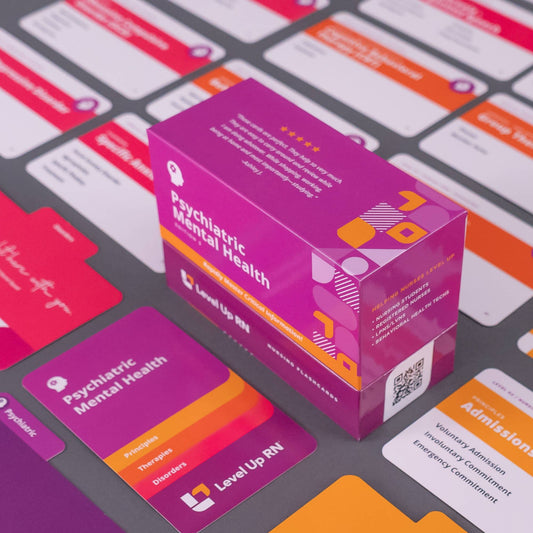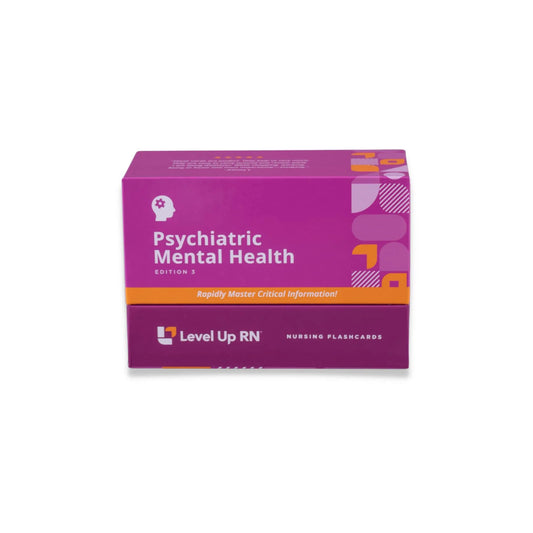Psychiatric Mental Health, part 29: Disorders - Bipolar Disorder
Updated: Cathy ParkesBipolar Disorder. Types of bipolar, symptoms of mania and depression, treatment of bipolar disorder, and nursing care of patients with bipolar disorder.
Full Transcript: Psychiatric Mental Health, part 29: Disorders - Bipolar Disorder
Full Transcript: Psychiatric Mental Health, part 29: Disorders - Bipolar Disorder
Hi, I'm Cathy with Level Up RN. In this video we will be talking about bipolar disorder which is a super important topic to know for nursing school. At the end of the video, I'm going to give you guys a little quiz to test your knowledge of some of the key points I'll be covering. So definitely stay tuned for that. And if you have our Level Up RN, psychiatric mental health nursing flashcards definitely pull out your flashcards so you can follow along with me. And pay close attention to the bold red text on these cards because those represent the most testable facts that you will likely see show up on a nursing school exam. Bipolar disorder is a mental health disorder characterized by mood swings. So with this disorder, we will have periods of mania or hypomania and periods of depression. So with bipolar I, we have episodes of severe mania and periods of depression. With bipolar II, we have periods of hypomania and periods of depression. So hypomania is a milder form of mania. So hypo means below. So hypomania is below mania. It's not as severe. So what is mania? When a patient is experiencing mania, they are very talkative, very excited, have racing thoughts. They are easily distracted and they have a hard time staying still. So reading about or hearing about the symptoms of mania is one thing, seeing it in action is another. So I was fortunate enough in my nursing school experience that I got to go to a behavioral health unit for my clinicals. And I got to speak with a patient who was experiencing mania.
And at first, it wasn't obvious that anything was wrong. She was very talkative and very friendly but the longer I talked to her she just didn't stop, right? She didn't come up for air. And she would change the subject every minute or less. And there was no way I could get a word in edgewise or ask any questions because she was just going. It was like she was going 150 miles an hour. The whole time she was experiencing mania. And it was exhausting for me to talk to her. I can't imagine how exhausted she was being in that manic episode. During manic episodes, patients may demonstrate poor judgment or engage in detrimental behaviors such as unsafe sexual practices or excessive spending. In addition, during mania patients will have decreased appetite and decreased sleep, which places them at risk for malnutrition and exhaustion. Then during periods of depression, patients may have symptoms such as a flat affect, slow speech, minimal movements, anhedonia which means lack of pleasure, negative thoughts, as well as a feeling of hopelessness or worthlessness. Bipolar disorder is diagnosed when a patient's mood episodes impact their ability to function or impact their social and or occupational environments. And it's going to be important that we rule out any other causes of the patient's symptoms, which can include substance use as well as an underlying disorder such as thyroid dysfunction.
In terms of treatment, medications that are used to treat bipolar disorder include mood stabilizers as well as atypical antipsychotics. Other therapy options include cognitive behavioral therapy as well as electroconvulsive therapy. And then I would also be familiar with something called ACT, which is Assertive Community Treatment. So ACT is particularly helpful for patients who have persistent and severe bipolar disorder. This is a multidisciplinary team approach that really focuses on treating the patient in the community and this helps to prevent hospitalizations as well as other complications. Nursing care of a patient with bipolar disorder is super important to know for your nursing school exams. As the nurse, you want to decrease stimuli, remove dangerous items from the environment, remain calm, and set clear limits. You'll also want to monitor your patient's intake and output as well as their sleep patterns due to the risk for malnutrition and sleep deprivation. You also want to provide high protein high-calorie finger foods that can be eaten on the go and then finally you need to protect your patient from poor judgment. Which includes unsafe sexual practices, as well as excessive spending.
All right, it's quiz time and I've got three questions for you. Question number one, during episodes of blank a patient with bipolar disorder, will exhibit symptoms, such as racing thoughts and the inability to stay still. The answer is mania. Question number two, which type of bipolar disorder is characterized by episodes of hypomania and depression? The answer is bipolar II. Question number three, how can you help a patient with bipolar disorder get adequate nutrition during manic episodes? The answer is provide high-calorie high protein finger foods that can be eaten on the go. All right, that is it for this video. I hope you found it to be helpful. Thank you so much for watching. Hypo means below. So.


